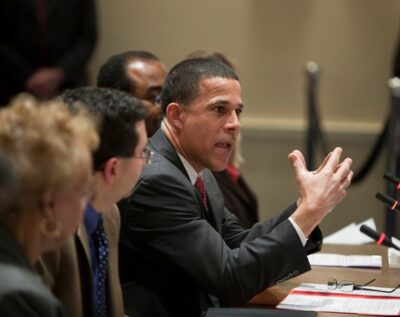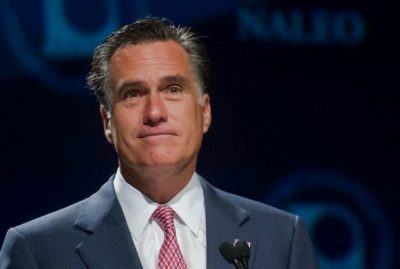Legislation

Don’t Jump to Conclusions About Costs of Deferred Action
The Associated Press (AP) reported yesterday that the deferred action initiative for eligible, young immigrants, which is still under development, could cost more than $585 million. While some critics immediately jumped on this as proof that taxpayers would be made to pay for the new initiative, that’s just not the way things work at USCIS. While taxpayers foot the bill for Immigration and Customs Enforcement and Custom and Border Patrol operations, (including the cost of detention and deportation of immigrants) the public doesn’t routinely foot the bill for programs administered by U.S. Citizenship and Immigration Services. In fact, it’s much more likely that the deferred action initiative will be paid for by the people who use it. Read More

New Brookings Report Examines Demand for H-1B High Skilled Worker Visas
Who uses H-1Bs and for what types of jobs is a topic of constant debate in Congress and in communities across the country. The Brookings Institute recently released a new report mapping H-1B workers in the U.S which addresses some of these questions and sheds new light on the topic. The H-1B program allows employers to hire foreign workers in specialty occupations for a temporary period of time. Currently, H-1Bs for for-profit employers are capped at 65,000 per year, with an additional 20,000 visas for workers with advanced degrees from U.S. universities. Research, non-profit, and government organizations can also request H-1B workers, and those visas are uncapped. Read More

Lieutenant Governor Makes Plea for Maryland DREAM Act
At the end of its 2011 legislative session, Maryland lawmakers passed a bill that would allow certain undocumented students to pay in-state tuition rates at Maryland community colleges, joining 12 other states with similar laws. Now, however, opponents of the law have gathered enough signatures to suspend the law and force a referendum come November. Maryland’s Lieutenant Governor Anthony Brown, an advocate for affordable higher education, responded with a plea to voters to consider the contributions of these students and the value of education for all Maryland residents. Meanwhile, lawmakers in other states like Ohio and New Jersey are considering legislation that makes higher education more affordable to all its residents. Read More

California DREAMers Exhibit High Levels of Civic Participation, Yet Face Significant Hardships
By Caitlin Patler, Ph.D. Candidate in Sociology, UCLA There are roughly 5 million undocumented children and young adults currently living in the U.S. today, 24% (or 1.1 million) of whom live in California. As in other states, California’s undocumented youth face a unique and challenging paradox. On one hand, they work hard, excel academically, participate in their communities and have high educational and career aspirations in the only country they’ve ever known. On the other hand, their immigration status severely limits their opportunities, aspirations and ability to contribute fully to U.S. society. A new research brief, co-authored by Veronica Terriquez and this author, highlights the experiences of undocumented youth in California—many of whom disproportionally experience economic and personal hardships. Read More

Secretary Napolitano Clarifies President’s Deferred Action Plan…Again
Today, DHS Secretary Janet Napolitano testified before the House Judiciary Committee and, as expected, defended the administration’s use of prosecutorial discretion and recently announced deferred action policies for qualified DREAMers—fielding questions and accusations from those who would rather take Napolitano to task than focus on creating smart, humane, and effective immigration policies. Read More

Critics Try to Sink Obama’s Deferred Action Program Before It Even Begins
Secretary Janet Napolitano is set to testify before the House Judiciary Committee tomorrow and the number one topic is likely to be the June 15 announcement of Deferred Action for Dreamers. Now that a majority of the Supreme Court has blessed the use of prosecutorial discretion as a legitimate function of the executive branch, critics of deferred action for DREAMers have moved on to a golden oldie: raising the specter of fraud in order to defeat or delay the program. In a recent letter to ICE Director John Morton, Judiciary Chair Lamar Smith argued that the new initiative will invite thousands of undocumented immigrants to fake documents proving that they meet the requirements of the program, likening it to the Special Agricultural Worker legalization program of 1986. By conjuring up ghosts of the past, Congressman Smith not only confuses the nature of legalization and deferred action, but ignores the dramatic changes in immigration adjudication and enforcement that have taken place since 1986. Read More

Civil Rights Groups Resume Legal Challenges to Alabama’s Immigration Law
Less than three weeks after the Supreme Court’s landmark decision in Arizona v. United States—which struck down three provisions of SB 1070 and invited future challenges to a fourth—civil rights groups are back in court resuming their challenges to copycat laws in other states. Going forward, the lawsuits will focus more on how to interpret the Justices’ decision and less on theoretical legal questions about states’ rights. While the cases in Alabama and other states may take years to resolve, it is already clear that parts of the laws will be immediately struck down. Read More

How the President’s Deferred Action Initiative Will Help the U.S. Economy
President Obama’s June 15 “deferred action” announcement is good not only for the 1.4 million unauthorized children and young adults who have been granted a temporary reprieve from deportation, but also good for the U.S. economy. Each year, tens of thousands of unauthorized students graduate from primary or secondary school, often at the top of their classes. They have the drive and intelligence to become doctors, nurses, teachers, and entrepreneurs, but their lack of legal status has prevented them from attending college or working legally. The President’s deferred action initiative has finally provided them with an opportunity to live up to their full potential and, in the process, earn more, spend more, and pay more in taxes. Read More

In Arizona Case, Supreme Court Affirms Legality of Prosecutorial Discretion
The Supreme Court dealt a blow to the restrictionist movement on Monday by striking down three provisions of Arizona SB 1070 and leaving a fourth vulnerable to future challenge. But in a lesser noticed development, the Court also undercut the arguments of critics who contend the President violated the Constitution by recently directing his administration not to deport otherwise removable immigrants who were brought to the country as children. As the majority opinion confirmed—and not even Justice Scalia denied—the President’s authority to set enforcement priorities is a valid and important aspect of the immigration system. Read More

In Speech, Romney Provides Few Details on Immigration Policy
On Thursday, Mitt Romney gave a much-anticipated speech in which he was expected to address whether—as President—he would reverse the new Obama administration policy toward immigrant youths who would qualify for the DREAM Act. The answer? It’s still unclear. Despite adopting a noticeably softer tone toward undocumented immigrants, Romney again failed to say whether he would overturn the policy and provided few other details as to how he would tackle the most intractable problem of the immigration debate. Read More
Make a contribution
Make a direct impact on the lives of immigrants.
